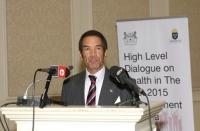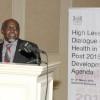President Khama opens the Dialogue on Health in the Post-2015 Development Agenda
Gaborone, Botswana, 5 March 2013 -- His Excellency the President Lt. General Seretse Khama Ian Khama officially opened the High Level Dialogue on the MDG Post-2015 Health Agenda on 5th September 2013 at the Gaborone International Conference and Convention Centre.
About 50 senior officials and experts are participating in the meeting. Among them are Heads of United Nations agencies, including the WHO Director-General Dr Margaret Chan, the Executive Director of the United Nations Children’s Fund (UNICEF) Anthony Lake, and ministers of health from a number of countries as well as representatives from the UN Secretary General’s High-level Panel of Eminent Persons on Post-2015 development planning, global health partnerships, the private sector, civil society organizations and academia.
The expectation is that this meeting will produce recommendations on the future direction of health in the post-2015 development agenda.
In his official opening statement, President Khama thanked the UN for facilitating the consultation and bringing it to Botswana. He thanked the Government of Sweden for inviting Botswana to co-lead the consultation process. The Swedish Government was represented by its Minister of International Development Cooperation Honourable Gunilla Carlsson. The President also thanked other partners and stakeholders for their contributions and participation. President Khama highlighted the importance of the consultation and especially the key themes, relating them to current, past and future developments.
His Excellency cited the 2012 UN Conference on Sustainable Development (Rio+20) which described the links between health and development. The President further reflected that the Rio+20 document noted that Health is a precondition for sustainable development and that sustainable development can only be achieved in the absence of a high prevalence of debilitating communicable and non-communicable diseases. In this context, His Excellency indicated that it is very important that the linkages between health and development should be more clearly articulated, more visible and supported by a policy framework that reflects these linkages between health and other sectors to drive the new development agenda.
His Excellency further noted that “It is generally acknowledged that MDGs directly related to health raised the profile of health in global development to the highest political levels, increasing global development assistance for health and commitment at national levels, in addition to leading to global acceptance of the centrality of health to human development. Much will still need to be done after 2015 to sustain these gains in many countries including Botswana. What will be important for the future agenda going forward, is that the contextual factors around health and its relationship to broader human development are now better appreciated at all levels of society, and therefore the opportunity exists for the global community to define a framework and path that benefits from the lessons of the MDGs and other sustainable development efforts.”
The meeting is expected to end later today.




